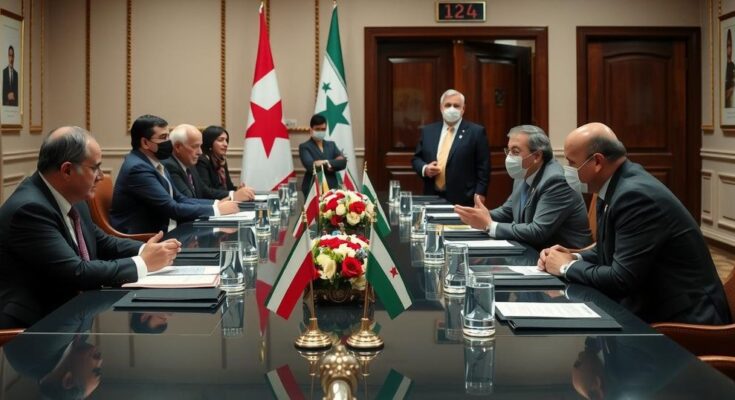U.S., Turkey, and Arab officials have committed to supporting a peaceful transition in Syria during discussions in Jordan. They unanimously called for an inclusive Syrian government while expressing concern over regional stability. Despite HTS’s involvement, skepticism remains regarding their intentions, while key players like Iran and Russia were notably absent from the talks. The need for both internal and external unity is crucial for Syria’s future.
In recent discussions held in Jordan, officials from the United States, Turkey, and several Arab nations emphasized their collective commitment to fostering a peaceful transition in Syria. Jordanian Foreign Minister Ayman Safadi highlighted the region’s desire to prevent chaos in Syria. Secretary of State Antony Blinken confirmed that the U.S. had established communication with the rebel group Hayat Tahrir al-Sham (HTS), which played a significant role in the conflict against President Bashar al-Assad. A joint statement underscored the urgent need for an inclusive Syrian government that honors minority rights and does not provide sanctuary to terrorist organizations.
The talks underscored the critical need for new governance that represents all Syrian citizens, reflecting the dynamic and often tumultuous situation within Syria. Iraqi Foreign Minister Fuad Hussein expressed concerns regarding the potential for regional instability reminiscent of Libya’s post-Gaddafi turmoil. Additionally, Turkish Foreign Minister Hakan Fidan maintained that it is essential to reform existing Syrian institutions to thwart the influence of terrorism during the transition phase, advocating for collaborative efforts that learn from past missteps.
Although HTS has suggested intentions for an inclusive government, skepticism remains due to the group’s prior violent jihadist activities. Secretary Blinken acknowledged direct communications with HTS, particularly relating to the case of missing American journalist Austin Tice, despite HTS’s current designation as a terrorist entity. Notably absent from these discussions were representatives from Syria, as well as from Iran and Russia, nations that supported Assad’s regime and contributed to its survival throughout the conflict.
The discussions in Jordan shed light on the significant external influences that have long impacted Syria’s landscape. It is evident that any emerging political structures in Syria will require both internal unity and external support to secure a hopeful future for the Syrian populace, who recently glimpsed the possibilities of freedom.
The conflict in Syria has been a tumultuous affair involving various factions, international interventions, and a humanitarian crisis impacting millions. Since the outbreak of the civil war in 2011, various parties, including regional powers and foreign governments, have competed for influence in the region. The recent focus on establishing a peaceful transition aims to address the fractures within Syrian society and promote a stable form of governance that respects human rights and fosters unity.
The collaborative efforts of the U.S., Turkey, and Arab nations signal a renewed commitment to a peaceful resolution in Syria. The establishment of an inclusive government that prioritizes minority rights and unity is paramount. However, skepticism regarding the commitment of certain factions, such as HTS, coupled with the absence of key players in the discussion, complicates the path forward. For Syria to emerge from the shadows of its complex past, external and internal coherence will be essential to ensure lasting peace and stability for its citizens.
Original Source: www.bbc.co.uk




